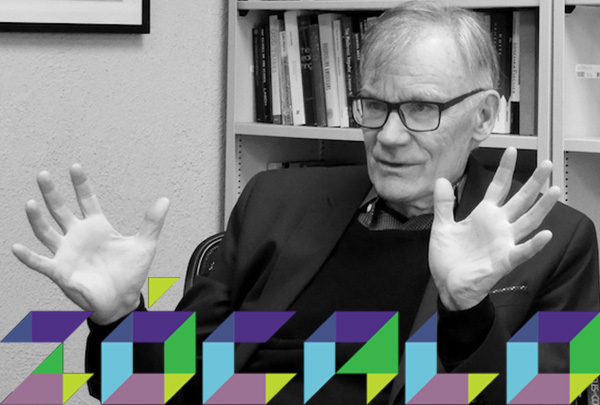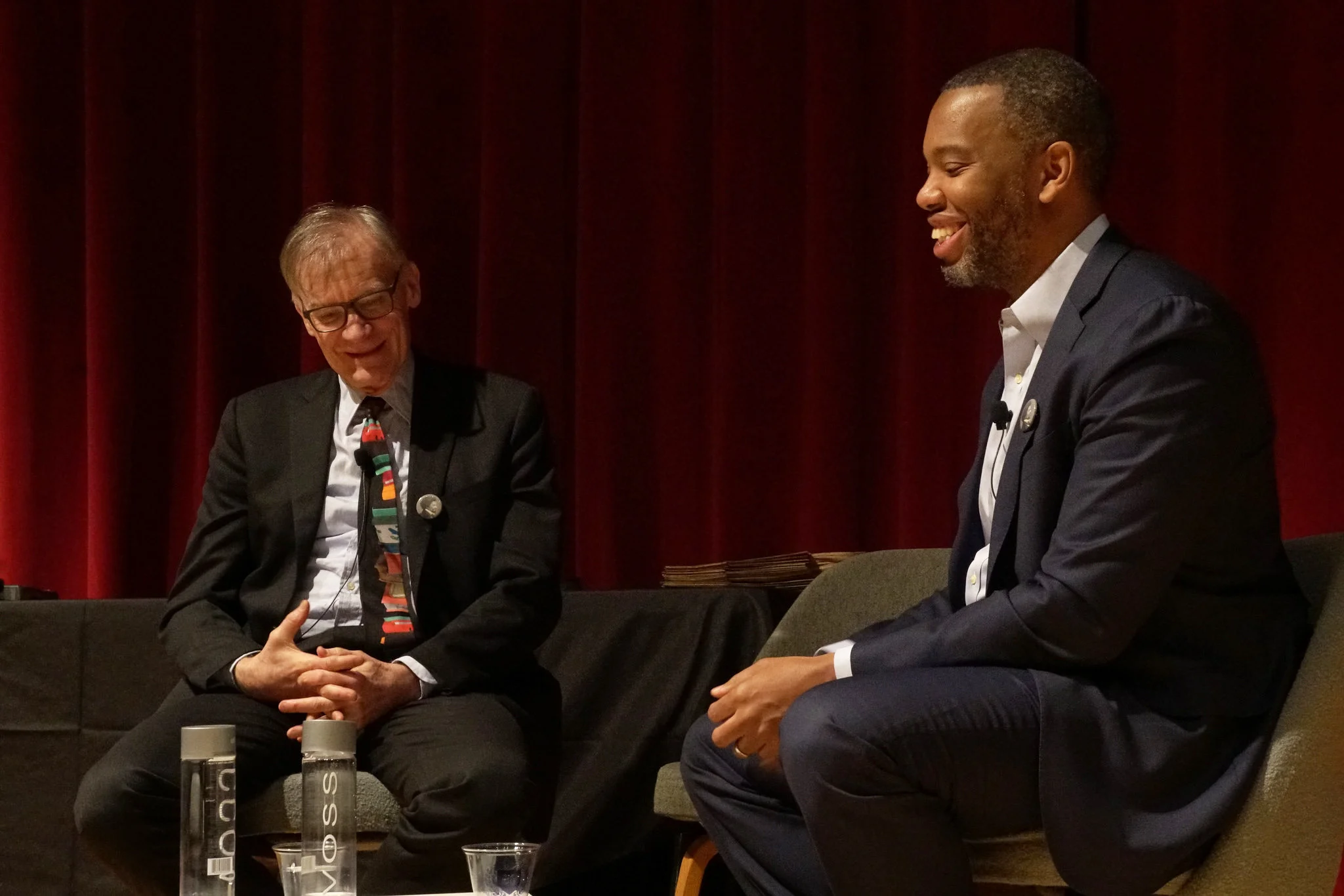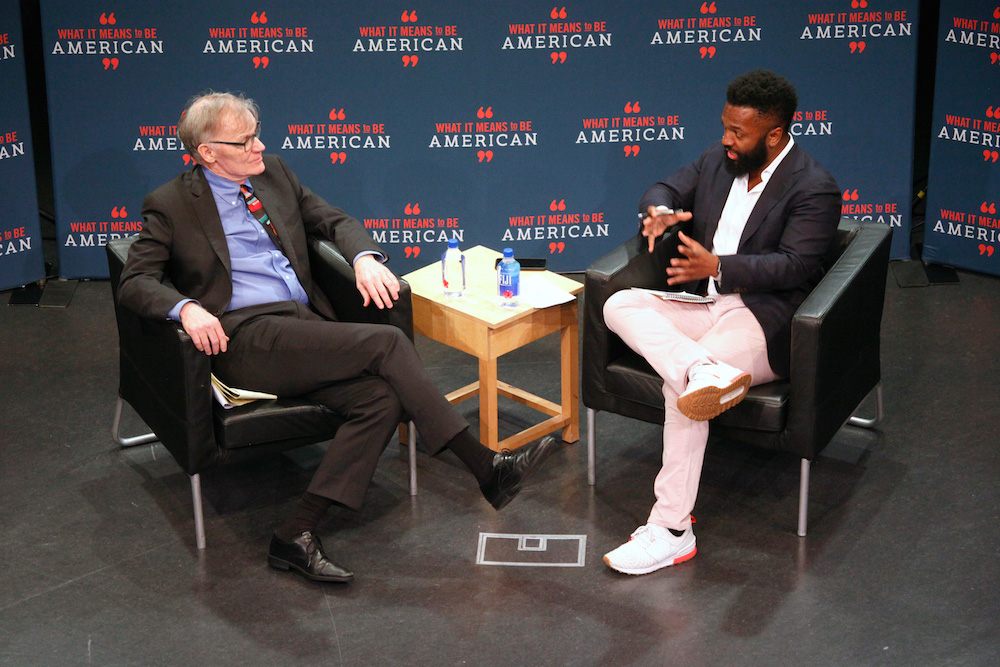David Blight sits down with Zócalo Publisher and Editor-in-Chief Gregory Rodriguez to talk about his 2001 book Race and Reunion: The Civil War in American Memory. They discuss the differences between memory and history, the three competing stories Americans tell about the Civil War, and why Walt Whitman is our death poet.
Read MoreDavid Blight discussed his new book, “Frederick Douglass: Prophet of Freedom” (Simon & Schuster, October 2018) with Ta-Nehisi Coates, distinguished writer in residence at NYU’s Arthur L. Carter Journalism Institute, and author of “Between The World And Me” and “We Were Eight Years in Power,” at the Yale University Art Gallery, Thursday, December 6, 2018.
View video: https://www.facebook.com/GilderLehrmanCenter/videos/369593643792722/
Read MoreDavid Blight discussed his new book, “Frederick Douglass: Prophet of Freedom” (Simon & Schuster, October 2018) with cultural critic, comedian, and author Baratunde Thurston, at the National Center for the Preservation of Democracy in downtown Los Angeles on November 29th. The dialogue, titled “What Does the Life of Frederick Douglass Tells Us About America?” was a Zócalo Public Square/Smithsonian/ASU “What It Means to Be American” event.
View video: http://www.zocalopublicsquare.org/category/events/video-archive/?postId=98534&fbclid=IwAR1ZuyayJYw2_8NaJX6ikgiAz-_NXExTBJ9c-wKmWCLU10u_4XuHcbeS-tk
Read MoreDavid Blight arrives in New York pulling his carry-on luggage, en route from Washington, soon to fly onwards to San Francisco. Such is the interest in his new biography of Frederick Douglass, a book 10 years in the writing and a whole career in the making, he will be on the road till December.
He takes off his lovingly battered Michigan State cap, picks up a coffee and sits down for another conversation.
Read MoreDavid Blight, author of “Frederick Douglass: Prophet of Freedom,” speaks with The Washington Post’s Jonathan Capehart during an interview for the “Cape Up” podcast on Oct. 2 at the WNYC radio studios in New York City.
Listen to the podcast: https://www.washingtonpost.com/podcasts/cape-up/what-trump-needs-to-learn-about-frederick-douglass/?utm_term=.f88c7ce5ea30
Read MoreWith President Trump in the White House, everything seems under assault. Civil rights, the rule of law, our moral standing, the global liberal democratic order the United States spent decades, blood and treasure helping to form and maintain. It’s all so precarious, unsettled and unprecedented. But is it, really?
During the pilgrimage with the Faith & Politics Institute last weekend to western New York state and the landmarks of the abolition and women’s suffrage movements that were centered there, we were reminded that these dark days are neither new nor insurmountable. The scene was a panel I moderated with Rep. Tom Reed (R-N.Y.), Rep. Carolyn B. Maloney (D-N.Y.) and two history professors.
Read MoreThe Root, May 28, 2018, video interview with David Blight about the origins of Memorial Day.
View video: https://www.theroot.com/black-people-created-memorial-day-literally-1826334056
Read More“Where We Live” podcast with David Blight, Michael Harriot, Lecia Brooks, and Fabian Wichmann
Listen to audio: http://wnpr.org/post/confronting-hate-tolerance-intolerance-and-rise-white-nationalism
Read More(CNN) Maine Gov. Paul LePage defended monuments to the Confederacy in a radio interview on Tuesday, claiming that 7,600 Mainers fought for the South and that the war was initially about land, not slavery.
Two Civil War historians contacted by told CNN disputed LePage's assertions.
Read MoreThe reason the South fought the American Civil War has been contested ever since the Confederacy surrendered in 1865. An odd turn of events, considering that when 11 Southern states seceded from the Union at the war’s outset, they were very clear about why they were doing it.
Read MoreDavid Blight discusses Frederick Douglass in an interview with Susan Gonzalez from YaleNews, February 17, 2017.
More than 30 years ago, Yale historian David Blight stood high atop a ridge near the Maryland coast and took in a view, the memory of which still awes him.
It was of the Chesapeake Bay in the summer, dotted with the white sails of boats, from a vantage point described more than 100 years earlier by the famed former slave, abolitionist, and orator Frederick Douglass.
Read MoreDavid Blight appears in the PBS documentary film Birth of a Movement. The film was aired on February 6th, 2017 at 10:00pm.
In 1915, Boston-based African American newspaper editor and activist William M. Trotter waged a battle against D.W. Griffith’s technically groundbreaking but notoriously Ku Klux Klan-friendly The Birth of a Nation, unleashing a fight that still rages today about race relations, media representation, and the power and influence of Hollywood. Birth of a Movement, based on Dick Lehr's book The Birth of a Movement: How Birth of a Nation Ignited the Battle for Civil Rights, captures the backdrop to this prescient clash between human rights, freedom of speech, and a changing media landscape.
Read MoreNo sooner had the nation finished celebrating the sesquicentennial of the Civil War’s end this past spring than the Charleston massacre and confederate flag fracas reminded us that the past isn’t past and the conflicts at the heart of the war still smolder. Historian David Blight has been pointing that out for years in books such as Race and Reunion: The Civil War in American Memory. David says that America dropped the ball when it set aside Reconstruction and set about reconstructing memory itself, embracing some convenient myths and turning its back on civil rights and African Americans in the process. We talked about a legacy of lost opportunities and broken promises, willful forgetting and whitewashed history.
Read MoreDavid Blight, author of Race and Reunion: The Civil War in American Memory, talked about his book and responded to viewer questions.
Read MoreAugust 28th marks the 50th anniversary of the Rev. Martin Luther King, Jr.’s famous speech in front of the Lincoln memorial in Washington, D.C., when, at the close of the March on Washington, he spoke of his dream for racial harmony and economic equality in America.
Read MorePhoto Credit: Civil War remains Nicholas Kamm/AFP/Getty Images
Historian David Blight speaks at the Minnesota Historical Society's History Forum about the ways the Civil War has influenced American history and its society and people in the 150 years since.
Read MoreThe Gilder Lehrman Institute of American History, http://www.gilderlehrman.org/, presents historian David Blight on a meeting between abolitionist leader Frederick Douglass and Abraham Lincoln.
Read MoreScholars talked about the contributions, sacrifices, and challenges faced by African Americans who served in the U.S. Colored Troops during the Civil War.
Read More















